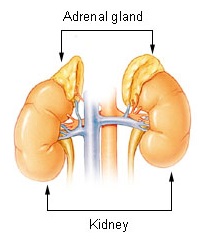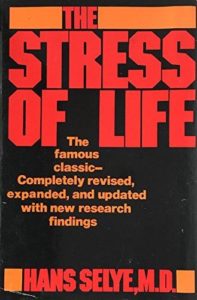What Is Adrenal Fatigue?
The adrenals are small glands about the size of an almond that sit on top of each kidney. They produce the stress hormone cortisol. Cortisol is our body’s major stress hormone. It greatly affects how we feel and how much energy we have. Adrenal fatigue is the concept that long-term stress lowers the adrenals gland’s ability to make cortisol. Low cortisol then causes people to feel tired.

The General Adaptation Syndrome
In 1956 Hans Selye’s book “The Stress of Life” was first published. He based this on animal research of cortisol and adrenal function in animals. Experiments where done such as putting rats under stress, then testing then for changes in cortisol and size of the adrenal glands. He found that stress caused profound changes to the adrenal glands in three stages. He called this the general adaptation syndrome.

Phase 1: Alarm
This is the fight-or-flight response. It’s designed to help us survive immediate danger. Cortisol surges to move more blood and oxygen to the lungs and muscle. Other systems not needed at the moment slow down.
Functions stimulated
- Increased blood pressure
- Strengthens heart contractions
- increases blood sugar
- Excites mood and focuses mental clarity.
Functions supressed
- Decreased digestion
- Decreased detoxification
- Lowers immune system function
- Protein catabolism. The body breaks down its own proteins for fast, emergency energy.
Phase 2: Resistance
If the acute stress does not go away, then cortisol can remain elevated. This lead to illness of high stress such as hypertension, and cardiovascular disease.Phase 3: Exhaustion
If the adrenals glands can’t keep up and cortisol production drops. Too much cortisol is bad, but so is too little. We need to have enough cortisol for the following processes:- Maintain blood sugar
- Maintain blood pressure
- Regulate inflammation
- Proper fluid and electrolyte regulation
Symptoms of adrenal fatigue include:
- Low blood sugar (may cause hypoglycemia)
- Inflammation (arthritis, aches, pains, worsens inflammatory conditions>
- Insomnia (especially people who wake 2 – 3AM)
- Decreased immune function – may often get sick with colds/flu/viral infections and takes longer to recover
- Low blood pressure – may feel faint when standing up quickly
- Cravings for salty food
- Depressed mood
- Frequent urination
Saliva Cortisol Tests
Cortisol is normally about 10 times higher in the morning than at night. It varies much during the day. Stress of eating sugar raises it. Reducing stress lowers it. A single blood test is typically not going to be very helpful.
When saliva cortisol tests came out, practitioners finally had a tool to measure cortisol through the whole day. Too high or low cortisol could now much more easily be found. Some people also have deregulated rhythms, such as cortisol low in the morning and high at night. At times knowing the pattern of adrenal function can help treatment.
For more on cortisol tests go to the functional medicine page.
What Is Stress?
Selye defined stress as “the body’s nonspecific response to any additional demand.” Any is the key word. It doesn’t matter if the stress is long hours at work, a poor diet, or physical illness. The body has only one stress response. It tells the adrenals to make more cortisol.
The society we live in puts great stress on people. This can be from working too many hours, emotional stress, or eating a bad diet. Lifestyle changes help. This includes meditation, exercise, calming music or anything else which relaxes the nervous system.
We can’t easily escape from our stress. But supplements for adrenal fatigue can help us handle it better.
- Herbal adaptogens
- Calming herbs
- B vitamins
- Pregnenolone and DHEA
- Glandulars
For more information, go to the page on adrenal supplements.
Adrenal Fatigue versus Chronic Fatigue Syndrome
Adrenal fatigue referrers to a state of diminished cortisol brought on by any prolonged stress.
Chronic Fatigue Syndrome is a condition of debilitating fatigue. It is typically associated with a weakened immune system. Someone with CFS may have adrenal fatigue, however the two are not the same.
For more information on Chronic Fatigue Syndrome go to this page.
Adrenal fatigue is one cause of fatigue. Is is not the only cause. The concept of adrenal fatigue is only useful within a holistic framework. Many different things can make someone feels tired.
Some of the more common triggers of fatigue include:
Infection
Heavy metals
Environmental toxicity
Candida and yeast
Viral infections
Lyme and confections
Poor immunity
Poor digestion
Anemia
Other hormonal issues
Structural / physical injury
Often several of these factors are working together to cause fatigue. It is important to support the adrenal glands, but this is often just one part of a larger picture.